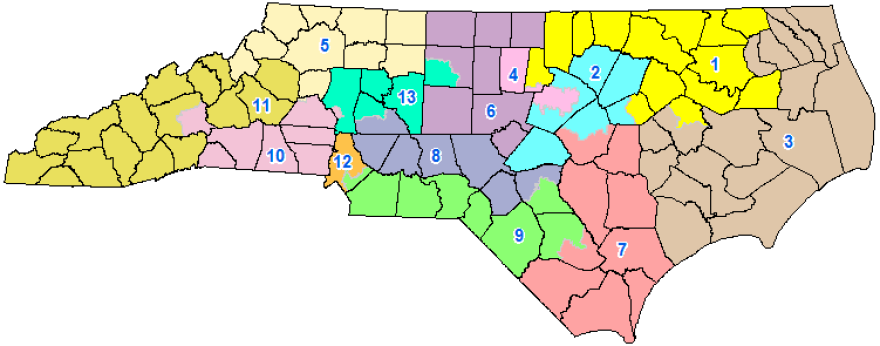The U.S. Supreme Court ruled Thursday that North Carolina’s Congressional map is not an unconstitutional political gerrymander.
In a 5-4 decision along ideological lines, Chief Justice John Roberts wrote that, “We conclude that partisan gerrymandering claims present political questions beyond the reach of the federal courts.”
WFAE’s political reporter Steve Harrison joins All Things Considered host Mark Rumsey to talk about the decision.
Harrison: This case was about two states: North Carolina and Maryland.
North Carolina’s Congressional Map, which was drawn by the Republican majority in the General Assembly, has given the GOP 10 of the state’s 13 seats. And that’s despite the Democrats winning close to half of the vote in Congressional elections.
The Maryland map favors Democrats.
Common Cause and the League of Women Voters sued over the North Carolina map. A three-judge panel ruled in their favor last fall and ordered new maps to be drawn. The GOP appealed, and the Supreme Court agreed to hear the case.
And the Republicans won this morning. It was a 5-4 decision, with the conservative justices joining Roberts.
Roberts wrote that the court doesn’t condone partisan gerrymandering, but it said it’s “beyond the reach of federal courts.”
The case was Common Cause vs. Rucho. That’s former state senator Bob Rucho of Mecklenburg County, who chaired the state senate committee that drew the districts. He says the court validated what the state did.
“What we’re talking about is a validation that the U.S. Constitution said that elected officials in the legislature have complete responsibility and authority in drawing those districts.”
Attorney Allison Riggs argued the case for the League of Women Voters. She dismissed Chief Justice John Roberts’ claim that the court doesn’t condone the Rucho map.
“To that this won’t be read as condoning excessive partisan gerrymandering doesn’t accord with the reality of what we see on the ground, which is extreme partisans celebrating this decision as a rubber stamp for what they have been doing for so many decades.”
Rumsey: What was Roberts’ reasoning for the decision?
Harrison: The opinion came back again and again to: where would a court draw the line?
He talked about a hypothetical “median” map that is the most fair. He asked, Would a map that deviated 20% from the median map be OK? What about 40%? Why or why not?
He also talked a lot about proportional representation. That’s the idea that if a political party receives 40% of the vote in an election, it should have about 40% of the legislative seats.
And he said that’s not what the Founding Fathers intended.
There was a lot of history in the opinion. Roberts noted that Whigs in Alabama in 1843 won 43% of the vote – and didn’t win a single seat.
Rumsey: In his opinion, Roberts wrote that gerrymandering can, at times, help the minority party. What did he mean?
Harrison: He wrote that a map that tried to make districts as competitive as possible could be a disaster for the minority party.
What he meant by that is that if you have a lot of 50-50 seats, one party could be completely wiped out in a wave election. He said that if you pack the minority party into some safe seats – like the Republicans did in North Carolina – the minority party will always be represented.
He also said that partisan gerrymandering is different than gerrymandering based on race, which the court has said is unconstitutional.
He wrote that “even the most sophisticated maps cannot reliably account for some of the reasons voters prefer one candidate over another.”
He did not mention North Carolina’s 9th District, but it’s a good example of what he was talking about.
The 9th District – which still hasn’t been resolved – was drawn to include south Charlotte precincts that usually vote for the GOP. But in last year’s Mark Harris-Dan McCready race, McCready won almost all of those precincts.
Rumsey: Elana Kagan wrote the dissent. What did she say?
Harrison: She was blistering.
She said the “partisan gerrymanders deprived citizens of their most fundamental of their constitutional rights.”
She wrote the gerrymanders “debased and dishonored our democracy, turning upside-down the core American idea that all governmental power derives from the people.”
She also wrote: “Is this how American democracy is supposed to work?”
Rumsey: So what happens next? The 2020 Census is coming, and states will be drawing their Congressional maps, is that right?
Harrison: Yes. And the Supreme Court said today – we will not get involved in any map, no matter how blatant the gerrymander is.
But the court did say that there are other ways to change the process. Roberts noted that the state courts can weigh in on state maps, and legislatures can create independent commissions to draw maps.
Common Cause has another lawsuit that is challenging North Carolina’s legislative map. It will likely end up before the North Carolina Supreme Court, which has a Democratic majority.
And remember – it’s the state legislatures that draw the Congressional maps.
State Rep. David Lewis, who is a defendant in the state case, called for Common Cause to drop that lawsuit today.
“The framers gave this responsibility, they vested this responsibility, in the state legislature,” Lewis said. “It is time for the state Democratic Party, Common Cause, and other aligned leftist groups to stop wasting taxpayer money on lawsuits and bring this conversation back to the legislature.”
Common Cause said it would not do that.
And here’s what Allison Riggs of the League of Women Voters said about their setback today:
“What we know is our democracy depends on us picking ourselves up, brushing ourselves off, and fighting again. And we will do that, the league will do that, common cause will do that.”
The Common Cause lawsuit over North Carolina’s state map goes to trial July 15.



